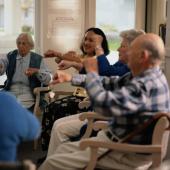
TUESDAY, Aug. 7 (HealthDay News) — Despite recent medical advances, the life expectancy of poor and less-educated Americans has increased only slightly over the past several decades, researchers say.
In some cases, life expectancy for people who don’t finish high school is actually getting shorter, the new study found. Meanwhile, Americans with higher levels of education and more socioeconomic benefits are living much longer than they were in the 1950s and 1960s.
“There are essentially two Americas,” the study’s lead author, Jay Olshansky, a professor of epidemiology at the University of Illinois at Chicago School of Public Health, said in a university news release. “The most highly educated white men live about 14 years longer than the least-educated black men. The least-educated black women live about 10 years less than the most-educated white women,” Olshansky explained.
“We must find a way to bring these subgroups of the population back into the present,” he added.
In conducting the study, the researchers analyzed trends in life expectancy from 1990 through 2008. Specifically, they looked at how people’s age, sex, race and education influenced their longevity.
The study revealed that Americans with less than a high school education have life expectancies similar to adults who lived 50 to 60 years ago.
“Over the last couple of decades, almost all longevity boats have risen, but there have been some subgroups that have had a drop in life expectancy,” Olshansky noted. “It’s as if Americans with the least education are living in a time warp. The least-educated black men are living in 1954, black women in 1962, white women in 1964 and white men in 1972.”
White women who do not graduate from high school can expect to die five years sooner than other women with the same level of education did in 1990, the researchers were surprised to find.
The investigators also noted that black women with less than 12 years of education can expect to live until they are 74 years old, an increase of one year from two decades ago.
The authors pointed out that black women with the least amount of education are experiencing high levels of obesity, which may take a toll on their health. Less-educated white women, they speculated, might be harmed by behaviors such smoking as well as alcohol and drug use.
Education and socioeconomic status are key factors that play a role in life expectancy, the researchers said. They concluded that lifelong education is important to address the significant disparities in Americans’ longevity.
The study was published in the August issue of Health Affairs.
More information
The U.S. Centers for Disease Control and Prevention provides more facts and statistics on life expectancy.

